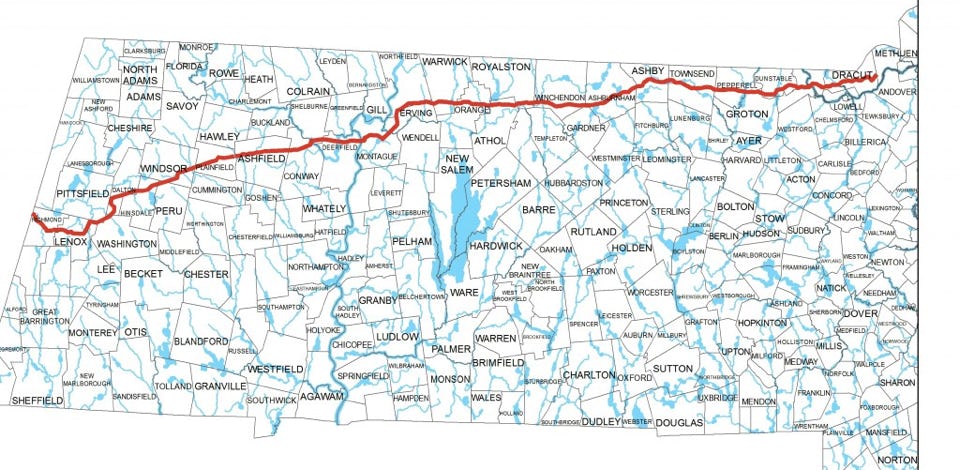Impact to open space and conservation land
•The main line from NY to Dracut would cross more than 50 areas of priority habitat (areas identified by the Massachusetts Natural Heritage and Endangered Species Program)
•72 miles of core habitat
•Over 1500 acres of forested, agricultural and open meadow land would be taken during construction
•30.9 miles of core waters — 230 wetlands, 118 waterbodies, including 15 outstanding resource waters, 13 public water supplies, 2 scenic rivers, and 4 wellhead protection areas
•Horizontal drilling would take place under rivers; trenching would occur in other wetlands
•Blasting would occur in areas with ledge and granite
•Tennessee gas uses an ‘Integrated Vegetation Management Plan’ which includes use of herbicides and pesticides on Right of Ways (ROWs)- You may also find this information in the mass.gov EEA section Vegetation Management & Yearly Operation Plans – scroll down to Tennessee Gas Pipeline – Vegetation Management Plan (2011-2015)
‘The proposed pipeline will be constructed through ecologically sensitive lands mapped within BioMap II and Priority Habitat (as designated by the Natural Heritage and Endangered Species Program), UMass’ Conservation Assessment and Prioritization System, and state -designated Areas of Critical Environmental Concern.
It also will be cut through locally designated and state funded open space lands owned and managed by municipalities, land trusts, and private organizations such as Mass Audubon and local watershed organizations, as well as state lands managed by the Division of Fisheries and Wildlife and the Department of Conservation and Recreation.
The pipeline will result in a permanent fifty foot wide swath of about 250 miles in length, much of it through ecologically sensitive lands, on which trees could not grow and structures not be built. There have been no public hearings to assess the harm to natural resources that will result from the project and no public process to identify appropriate alternative routes for the pipeline or evaluate if a pipeline of that magnitude is needed.’ -from a May 8, 2014 letter to Governor Deval Patrick from the Massachusetts Association of Conservation Commissions (MACC)
Environmental organizations challenge ongoing Kinder Morgan/Tennessee Gas Pipeline Projects:
Washington, DC: In a decision issued June 6, 2014, the United States Court of Appeals for the District of Columbia, ruled that the Delaware Riverkeeper Network, the NJ Sierra Club and New Jersey Highlands Coalition were correct in their legal challenge to the Tennessee Gas Pipeline Company’s Northeast Upgrade Project and ordered additional analysis and review.
Read more:
Press Release Delaware Riverkeeper Network, New Jersey Highlands Coalition, New Jersey Sierra Club
Decision US Court of Appeals – Delaware Riverkeeper Network ET AL, Petitioners v. FERC, Respondent and Tennessee Gas Pipeline Company, Intervenors
Pipeline Watch Training Module – Detailing the installation of the Tennessee Gas pipelines in PA – the ‘Northeast Upgrade Project’







All rights reserved. All content on this site property of Nashoba Conservation Trust.
Do not copy or reproduce in any form for any reason without written permission from Nashoba Conservation Trust.